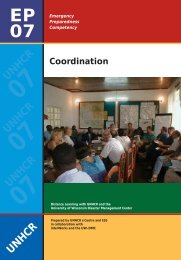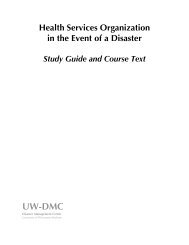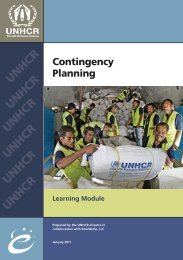Managing External Relations - Disaster Management Center ...
Managing External Relations - Disaster Management Center ...
Managing External Relations - Disaster Management Center ...
Create successful ePaper yourself
Turn your PDF publications into a flip-book with our unique Google optimized e-Paper software.
EP<br />
04<br />
64<br />
<strong>Managing</strong> <strong>External</strong> <strong>Relations</strong><br />
Situation C—You have answered a question exactly as you have practised it but one reporter<br />
demands more explanation. Others join in with more probing questions. You are now on uncertain<br />
ground and start drumming the podium out of nervousness.<br />
Situation A—Try to take control of the situation by selecting one question to respond to while<br />
making eye contact with the reporter who asked the question and ignoring any cameras or<br />
microphones. Use a moderate tone of voice so that the others will be quiet in order to hear your<br />
response. If you are totally unprepared for the questions, it is best to say ‘I need to clarify some<br />
points before I answer your questions’ or ‘I will get back to you with the answer to that question<br />
later.’ If you find it difficult to be friendly or smile at a time like this, concentrate on listening to<br />
the questions and carefully composing your responses.<br />
Situation B—You must counter the accusation, assumption or inaccurate remark, or it may be<br />
implied that you agree with it. Avoid using the words of the questioner, so as not to validate them.<br />
For example, if the question is, ‘Don’t you think that the agencies are acting irresponsibly by not<br />
confronting the violations?’ Your answer may be, ‘We are pursuing all possible means to uphold<br />
human rights.’<br />
When faced with a contentious question, remember the main points of your message, rather<br />
than the issues being forced by the questioner. ‘Bridging’ sentences may be useful such as, ‘I<br />
understand your concern but the real issue is,’ ‘Let us not overlook,’ or ‘I’m sorry you feel that way<br />
but please consider this.’<br />
Situation C—You are under no obligation to reveal more than you want to. Avoid any speculative<br />
answers. If statements such as, ‘I do not have information on your request at this time’ or ‘Let me<br />
repeat the information I do have’ do not work, move on to other questions. Stay calm, smile, avoid<br />
nervous mannerisms that might make you seem more vulnerable, and give short answers. If that<br />
does not work, end the interview.








